formerly eScholarship Editions


|
|
|
|
Your request for similar items found 20 book(s). | Modify Search | Displaying 1 - 20 of 20 book(s) | |
| 1. | 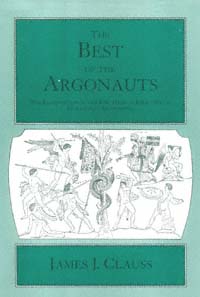 | Title: The best of the Argonauts: the redefinition of the epic hero in book one of Apollonius's Argonautica Author: Clauss, James Joseph Published: University of California Press, 1993 Subjects: Classics | Literature | Classical Literature and Language | Literary Theory and Criticism Publisher's Description: This revelatory exploration of Book One of the Argonautica rescues Jason from his status as the ineffectual hero of Apollonius' epic poem. James J. Clauss argues that by posing the question, "Who is the best of the Argonauts?" Apollonius redefines the epic hero and creates, in Jason, a man more realistic and less awesome than his Homeric predecessors, one who is vulnerable, dependent on the help of others, even morally questionable, yet ultimately successful.In bringing Apollonius' "curious and demanding poem" to life, Clauss illuminates two features of the poet's narrative style: his ubiquitous allusions to the poetry of others, especially Homer, and the carefully balanced structural organization of his episodes. The poet's subtextual interplay is explored, as is his propensity for underscoring the manipulation of the poetry of others through ring composition. [brief] Similar Items |
| 2. |  | Title: The returns of Odysseus: colonization and ethnicity Author: Malkin, Irad Published: University of California Press, 1998 Subjects: Classics | Classical History | Anthropology | Classical Literature and Language Publisher's Description: This remarkably rich and multifaceted study of early Greek exploration makes an original contribution to current discussions of the encounters between Greeks and non-Greeks. Focusing in particular on myths about Odysseus and other heroes who visited foreign lands on their mythical voyages homeward after the Trojan War, Irad Malkin shows how these stories functioned to mediate encounters and conceptualize ethnicity and identity during the Archaic and Classical periods. Synthesizing a wide range of archaeological, mythological, and literary sources, this exceptionally learned book strengthens our understanding of early Greek exploration and city-founding along the coasts of the Western Mediterranean, reconceptualizes the role of myth in ancient societies, and revitalizes our understanding of ethnicity in antiquity.Malkin shows how the figure of Odysseus became a proto-colonial hero whose influence transcended the Greek-speaking world. The return-myths constituted a generative mythology, giving rise to oral poems, stories, iconographic imagery, rituals, historiographical interpretation, and the articulation of ethnic identities. Reassessing the role of Homer and alternative return-myths, the book argues for the active historical function of myth and collective representations and traces their changing roles through a spectrum of colonial perceptions - from the proto-colonial, through justifications of expansion and annexation, and up to decolonization. [brief] Similar Items |
| 3. | 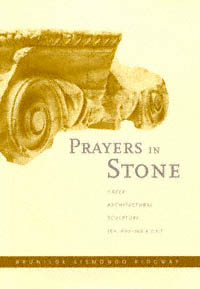 | Title: Prayers in stone: Greek architectural sculpture ca. 600-100 B.C.E Author: Ridgway, Brunilde Sismondo 1929- Published: University of California Press, 1999 Subjects: Classics | Art | Art and Architecture | Art History Publisher's Description: The meaning of architectural sculpture is essential to our understanding of ancient Greek culture. The embellishment of buildings was common for the ancient Greeks, and often provocative. Some ornamental sculpture was placed where, when the building was finished, no mortal eye could view it. And unlike much architectural ornamentation of other cultures, Greek sculpture was often integral to the building, not just as decoration, and could not be removed without affecting the integrity of the building structure. This book is the first comprehensive treatment of the significance of Greek architectural sculpture. Brunilde Sismondo Ridgway, a world-class authority on ancient Greek sculpture, provides a highly informative tour of many dimensions of Greek public buildings - especially temples, tombs, and treasuries - in a text that is at once lucid, accessible, and authoritative.Ridgway's pragmatism and common sense steer us tactfully and clearly through thickets of uncertainty and scholarly disagreement. She refers to a huge number of monuments, and documents her discussions with copious and up-to-date bibliographies. This book is sure to be acknowledged at once as the standard treatment of its important topic. [brief] Similar Items |
| 4. | 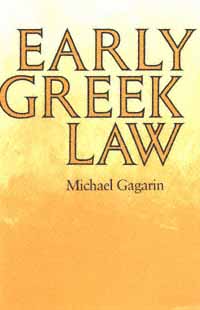 | Title: Early Greek law Author: Gagarin, Michael Published: University of California Press, 1989 Subjects: Classics | Classical Politics | Law Publisher's Description: Drawing on the evidence of anthropology as well as ancient literature and inscriptions, Gagarin examines the emergence of law in Greece from the 8th through the 6th centuries B.C., that is, from the oral culture of Homer and Hesiod to the written enactment of codes of law in most major cities. Similar Items |
| 5. | 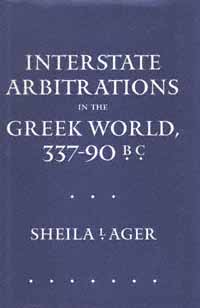 | Title: Interstate arbitrations in the Greek world, 337-90 B.C. Author: Ager, Sheila L 1956- Published: University of California Press, 1997 Subjects: Classics | Classical History | Ancient History Publisher's Description: A great deal of information has come to light over the past several decades about the role of arbitration between the Greek states. Arbitration and mediation were, in fact, central institutions in Hellenistic public life. In this comprehensive study, Sheila Ager brings together the scattered body of literary and epigraphical sources on arbitration, together with up-to-date bibliographic references, and commentary.The sources collected here range widely; Ager presents an exhaustive record of documents ranging from the settlement of a minor territorial squabble between two tiny city-states to the resolution of major conflicts separating the great powers of the day. In addition, Ager's introduction sets the documents in historical context and outlines distinctions among categories of arbitration. The work also includes indices to literary passages, inscriptions, persons, places, subjects, and Greek and Latin terms in the documents. This collection of many previously inaccessible texts will become a primary resource for any scholar or student working in the field of Hellenistic history. [brief] Similar Items |
| 6. | 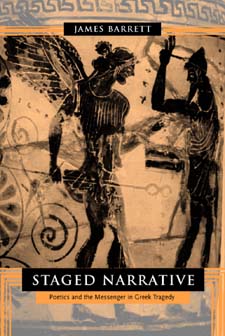 | Title: Staged narrative: poetics and the messenger in Greek tragedy Author: Barrett, James 1953- Published: University of California Press, 2002 Subjects: Classics | Classical Literature and Language Publisher's Description: The messenger who reports important action that has occurred offstage is a familiar inhabitant of Greek tragedy. A messenger informs us about the death of Jocasta and the blinding of Oedipus, the madness of Heracles, the slaughter of Aigisthos, and the death of Hippolytus, among other important events. Despite its prevalence, this conventional figure remains only little understood. Combining several critical approaches - narrative theory, genre study, and rhetorical analysis - this lucid study develops a synthetic view of the messenger of Greek tragedy, showing how this role illuminates some of the genre's most persistent concerns, especially those relating to language, knowledge, and the workings of tragic theater itself. James Barrett gives close readings of several plays including Aeschylus's Persians, Sophocles' Electra and Oedipus Tyrannus, and Euripides' Bacchae and Rhesos. He traces the literary ancestry of the tragic messenger, showing that the messenger's narrative constitutes an unexplored site of engagement with Homeric epic, and that the role illuminates fifth-century b.c. experimentation with modes of speech. Breaking new ground in the study of Athenian tragedy, Barrett deepens our understanding of many central texts and of a form of theater that highlights the fragility and limits of human knowledge, a theme explored by its use of the messenger. [brief] Similar Items |
| 7. | 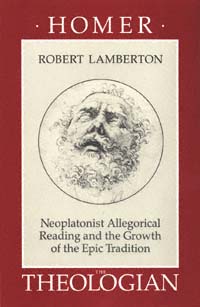 | Title: Homer the theologian: Neoplatonist allegorical reading and the growth of the epic tradition Author: Lamberton, Robert Published: University of California Press, 1989 Subjects: Classics | Classical Literature and Language | Literary Theory and Criticism Publisher's Description: Here is the first survey of the surviving evidence for the growth, development, and influence of the Neoplatonist allegorical reading of the Iliad and Odyssey. Professor Lamberton argues that this tradition of reading was to create new demands on subsequent epic and thereby alter permanently the nature of European epic. The Neoplatonist reading was to be decisive in the birth of allegorical epic in late antiquity and forms the background for the next major extension of the epic tradition found in Dante. [brief] Similar Items |
| 8. | 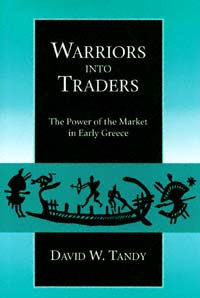 | Title: Warriors into traders: the power of the market in early Greece Author: Tandy, David W Published: University of California Press, 1997 Subjects: Classics | Ancient History | Classical History | Economics and Business | Anthropology | Politics Publisher's Description: The eighth century dawned on a Greek world that had remained substantially unchanged during the centuries of stagnation known as the Dark Age. This book is a study of the economic and cultural upheaval that shook mainland Greece and the Aegean area in the eighth century, and the role that poetry played in this upheaval. Using tools from political and economic anthropology, David Tandy argues that between about 800 and 700 B.C., a great transformation of dominant economic institutions took place involving wrenching adjustments in the way status and wealth were distributed within the Greek communities.Tandy explores the economic organization of preindustrial societies, both ancient and contemporary, to shed light on the Greek experience. He argues that the sudden shift in Greek economic formations led to new social behaviors and to new social structures such as the polis , itself a by-product of economic change. Unraveling the dialectic between the material record and epic poetry, Tandy shows that the epic tradition mirrored these new social behaviors and that it portrayed the stresses that economic change brought to the ancient Aegean world.Tandy brings in comparative evidence from other small-scale communities beset by changes, spotlighting the specific plight of one community, Ascra in Boeotia, on whose behalf Hesiod sang his Works and Days . The result is a lively, moving account of a human dilemma that, many centuries later, is all too familiar. [brief] Similar Items |
| 9. | 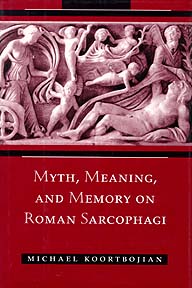 | Title: Myth, meaning, and memory on Roman sarcophagi Author: Koortbojian, Michael Published: University of California Press, 1995 Subjects: Classics | Art | Art History | Art and Architecture Publisher's Description: Michael Koortbojian brings a novel approach to his study of the role of Greek mythology in Roman funerary art. He looks at two myths - Aphrodite and Adonis and Selene and Endymion - not only with respect to their appearance on Roman sarcophagi, but also with regard to the myths' significance in the greater fabric of Roman life. Moving beyond the examination of these sarcophagi as artistic achievements, he sets them in their broader historical and social contexts.Remembrance was an important factor in ancient social life and fueled the need for memorials. In helping us to understand the powerful allusions that Greek myths presented for the Romans, and the role of those allusions in preserving the memory of the dead, Koortbojian effectively widens our vision of the ancient world. [brief] Similar Items |
| 10. | 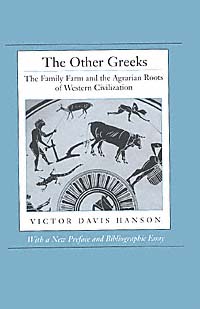 | Title: The other Greeks: the family farm and the agrarian roots of western civilization Author: Hanson, Victor Davis Published: University of California Press, 1999 Subjects: Classics | European History Publisher's Description: For generations, scholars have focused on the rise of the Greek city-state and its brilliant cosmopolitan culture as the ultimate source of the Western tradition in literature, philosophy, and politics. This passionate book leads us outside the city walls to the countryside, where the vast majority of the Greek citizenry lived, to find the true source of the cultural wealth of Greek civilization. Victor Hanson shows that the real "Greek revolution" was not merely the rise of a free and democratic urban culture, but rather the historic innovation of the independent family farm.The farmers, vinegrowers, and herdsmen of ancient Greece are "the other Greeks," who formed the backbone of Hellenic civilization. It was these tough-minded, practical, and fiercely independent agrarians, Hanson contends, who gave Greek culture its distinctive emphasis on private property, constitutional government, contractual agreements, infantry warfare, and individual rights. Hanson's reconstruction of ancient Greek farm life, informed by hands-on knowledge of the subject (he is a fifth-generation California vine- and fruit-grower) is fresh, comprehensive, and absorbing. His detailed chronicle of the rise and tragic fall of the Greek city-state also helps us to grasp the implications of what may be the single most significant trend in American life today - the imminent extinction of the family farm. [brief] Similar Items |
| 11. | 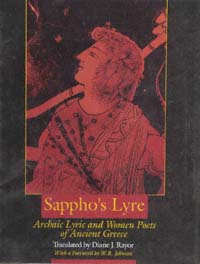 | Title: Sappho's lyre: archaic lyric and women poets of ancient Greece Author: Rayor, Diane J Published: University of California Press, 1991 Subjects: Classics | Classical Literature and Language | Literature in Translation | Poetry Publisher's Description: Sappho sang her poetry to the accompaniment of the lyre on the Greek island of Lesbos over 2500 years ago. Throughout the Greek world, her contemporaries composed lyric poetry full of passion, and in the centuries that followed the golden age of archaic lyric, new forms of poetry emerged. In this unique anthology, today's reader can enjoy the works of seventeen poets, including a selection of archaic lyric and the complete surviving works of the ancient Greek women poets - the latter appearing together in one volume for the first time. Sappho's Lyre is a combination of diligent research and poetic artistry. The translations are based on the most recent discoveries of papyri (including "new" Archilochos and Stesichoros) and the latest editions and scholarship. The introduction and notes provide historical and literary contexts that make this ancient poetry more accessible to modern readers.Although this book is primarily aimed at the reader who does not know Greek, it would be a splendid supplement to a Greek language course. It will also have wide appeal for readers of' ancient literature, women's studies, mythology, and lovers of poetry. [brief] Similar Items |
| 12. |  | Title: Envisioning power: ideologies of dominance and crisis Author: Wolf, Eric R 1923- Published: University of California Press, 1999 Subjects: Anthropology | Social Theory | Social and Political Thought | Political Theory | Intellectual History Publisher's Description: With the originality and energy that have marked his earlier works, Eric Wolf now explores the historical relationship of ideas, power, and culture. Responding to anthropology's long reliance on a concept of culture that takes little account of power, Wolf argues that power is crucial in shaping the circumstances of cultural production. Responding to social-science notions of ideology that incorporate power but disregard the ways ideas respond to cultural promptings, he demonstrates how power and ideas connect through the medium of culture.Wolf advances his argument by examining three very different societies, each remarkable for its flamboyant ideological expressions: the Kwakiutl Indians of the Northwest Pacific Coast, the Aztecs of pre-Hispanic Mexico, and National Socialist Germany. Tracing the history of each case, he shows how these societies faced tensions posed by ecological, social, political, or psychological crises, prompting ideological responses that drew on distinctive, historically rooted cultural understandings. In each case study, Wolf analyzes how the regnant ideology intertwines with power around the pivotal relationships that govern social labor. Anyone interested in the history of anthropology or in how the social sciences make comparisons will want to join Wolf in Envisioning Power . [brief] Similar Items |
| 13. | 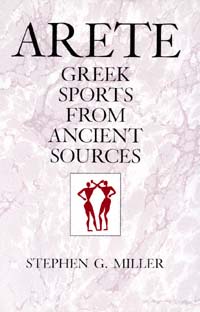 | Title: Arete: Greek sports from ancient sources Author: Miller, Stephen G Published: University of California Press, 1991 Subjects: Classics | Classical Literature and Language | History | Ancient History | Sports Publisher's Description: From the informal games of Homer's time to the highly organized contests of the Roman world, Miller has compiled a trove of ancient sources - Plutarch on boxing, Aristotle on the pentathlon, Philostratos on clay dust as an anti-perspirant and on the buying and selling of victories, Vitruvius on literary competitions, Xenophon on female body building. With fully twice as many texts as the highly successful first edition, this new version of Arete offers readers an absorbing lesson in the culture of Greek athletics from the greatest of teachers - the ancients themselves.These sources, which Miller himself has translated, provide unparalleled insights into ancient athletic practices and competitive festivals. They emphasize the fundamental role of athletics in education and shed light on such issues as the role of women in athletics and the politics and economics of the games. Ultimately they demonstrate that the concepts of virtue, skill, pride, valor, and nobility embedded in the word arete and so closely associated in the modern mind with Greek athletics are only part of the story from antiquity. [brief] Similar Items |
| 14. | 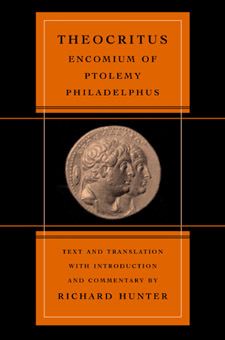 | Title: Encomium of Ptolemy Philadelphus Author: Theocritus Published: University of California Press, 2003 Subjects: Classics | Classical Literature and Language | Poetry Publisher's Description: Under Ptolemy II Philadelphus, who ruled Egypt in the middle of the third century B.C.E., Alexandria became the brilliant multicultural capital of the Greek world. Theocritus's poem in praise of Philadelphus - at once a Greek king and an Egyptian pharaoh - is the only extended poetic tribute to this extraordinary ruler that survives. Combining the Greek text, an English translation, a full line-by-line commentary, and extensive introductory studies of the poem's historical and literary context, this volume also offers a wide-ranging and far-reaching consideration of the workings and representation of poetic patronage in the Ptolemaic age. In particular, the book explores the subtle and complex links among Theocritus's poem, modes of praise drawn from both Greek and Egyptian traditions, and the subsequent flowering of Latin poetry in the Augustan age. As the first detailed account of this important poem to show how Theocritus might have drawn on the pharaonic traditions of Egypt as well as earlier Greek poetry, this book affords unique insight into how praise poetry for Ptolemy and his wife may have helped to negotiate the adaptation of Greek culture that changed conditions of the new Hellenistic world. Invaluable for its clear translation and its commentary on genre, dialect, diction, and historical reference in relation to Theocritus's Encomium, the book is also significant for what it reveals about the poem's cultural and social contexts and about Theocritus' devices for addressing his several readerships. COVER IMAGE: The image on the front cover of this book is incorrectly identified on the jacket flap. The correct caption is: Gold Oktadrachm depicting Ptolemy II and Arsinoe (mid-third century BCE; by permission of the Museum of Fine Arts, Boston). [brief] Similar Items |
| 15. | 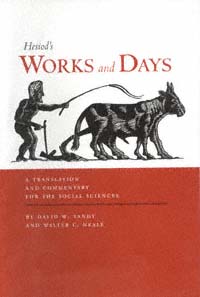 | Title: Hesiod's Works and days Author: Hesiod Published: University of California Press, 1997 Subjects: Economics and Business | Classics | Sociology | Ancient History Publisher's Description: This new, annotated translation of Hesiod's Works and Days is a collaboration between David W. Tandy, a classicist, and Walter Neale, an economist and economic historian. Hesiod was an ancient Greek poet whose Works and Days discusses agricultural practices and society in general. Classicists and ancient historians have turned to Works and Days for its insights on Greek mythology and religion. The poem also sheds light on economic history and ancient agriculture, and is a good resource for social scientists interested in these areas. This translation emphasizes the activities and problems of a practicing agriculturist as well as the larger, changing political and economic institutions of the early archaic period.The authors provide a clear, accurate translation along with notes aimed at a broad audience. The introductory essay discusses the changing economic, political and trading world of the eighth and seventh centuries B.C.E., while the notes present the range and possible meanings of important Greek terms and references in the poem and highlight areas of ambiguity in our understanding of Works and Days . [brief] Similar Items |
| 16. | 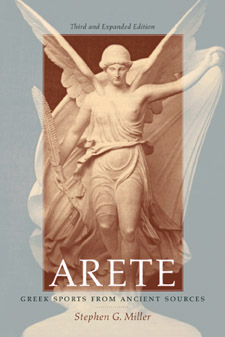 | Title: Arete: Greek sports from ancient sources Author: Miller, Stephen G. (Stephen Gaylord) 1942- Published: University of California Press, 2004 Subjects: Classics | Ancient History | Sports Publisher's Description: From the informal games of Homer's time to the highly organized contests of the Roman world, Miller has compileda trove of ancient sources: Plutarch on boxing, Aristotle on the pentathlon, Philostratos on the buying and selling of victories, Vitruvius on literary competitions, and Xenophon on female body building. With nearly 50 percent more texts than the highly successful second edition, this new version of Arete offers readers an absorbing lesson in the culture of Greek athletics from the greatest of teachers, the ancients themselves, and demonstrates that the concepts of virtue, skill, pride, valor, and nobility embedded in the word arete are only part of the story from antiquity. [brief] Similar Items |
| 17. | 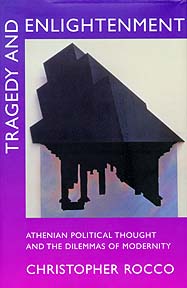 | Title: Tragedy and enlightenment: Athenian political thought, and the dilemmas of modernity Author: Rocco, Christopher 1958- Published: University of California Press, 1997 Subjects: Classics | Classical Philosophy | Classical History | Classical Literature and Language | Social and Political Thought | Social Theory Publisher's Description: Weaving together ancient Greek texts and postmodernist theory, Christopher Rocco addresses the debate between modernity and postmodernity that dominates contemporary theory. Interpreting Greek drama within a critical framework informed by contemporary theorists Foucault, Habermas, Horkheimer and Adorno, Tragedy and Enlightenment makes a sophisticated argument for the continuing relevance of the classical past, focusing on the subject of democracy.The starting point for Rocco's analysis is the impasse in contemporary political and cultural theory over the possibility and desirability of democracy in a postmodern world. After explaining the competing positions in the current debate, Rocco argues that ancient Greek tragedy and dialogue - specifically Sophocles' Oedipus , Plato's Republic and Gorgias , and Aeschylus' Oresteia - suggest alternate constructions for this and other postmodern problems.Rocco gives a detailed analysis of the contemporary divide over the theories of Jürgen Habermas and Michel Foucault and provides a provocative reading of Horkheimer and Adorno's Dialectic of Enlightenment. This original contribution to political and cultural discourse brings us to a new understanding of familiar texts and will alter the grounds of debate for students and scholars of the classical and the contemporary worlds. [brief] Similar Items |
| 18. | 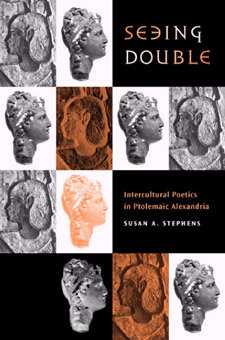 | Title: Seeing double: intercultural poetics in Ptolemaic Alexandria Author: Stephens, Susan A Published: University of California Press, 2003 Subjects: Classics | Classical Literature and Language | Poetry | Classical Politics Publisher's Description: When, in the third century B.C.E., the Ptolemies became rulers in Egypt, they found themselves not only kings of a Greek population but also pharaohs for the Egyptian people. Offering a new and expanded understanding of Alexandrian poetry, Susan Stephens argues that poets such as Callimachus, Theocritus, and Apollonius proved instrumental in bridging the distance between the two distinct and at times diametrically opposed cultures under Ptolemaic rule. Her work successfully positions Alexandrian poetry as part of the dynamic in which Greek and Egyptian worlds were bound to interact socially, politically, and imaginatively. The Alexandrian poets were image-makers for the Ptolemaic court, Seeing Double suggests; their poems were political in the broadest sense, serving neither to support nor to subvert the status quo, but to open up a space in which social and political values could be imaginatively re-created, examined, and critiqued. Seeing Double depicts Alexandrian poetry in its proper context - within the writing of foundation stories and within the imaginative redefinition of Egypt as "Two Lands" - no longer the lands of Upper and Lower Egypt, but of a shared Greek and Egyptian culture. [brief] Similar Items |
| 19. | 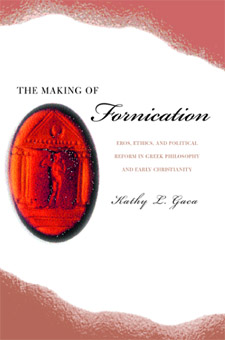 | Title: The making of fornication: eros, ethics, and political reform in Greek philosophy and early Christianity Author: Gaca, Kathy L Published: University of California Press, 2003 Subjects: Classics | Classical Philosophy | Classical Religions | Classical Politics | Christianity | Ethics | Social and Political Thought | Ancient History | Intellectual History Publisher's Description: This provocative work provides a radical reassessment of the emergence and nature of Christian sexual morality, the dominant moral paradigm in Western society since late antiquity. While many scholars, including Michel Foucault, have found the basis of early Christian sexual restrictions in Greek ethics and political philosophy, Kathy L. Gaca demonstrates on compelling new grounds that it is misguided to regard Greek ethics and political theory - with their proposed reforms of eroticism, the family, and civic order - as the foundation of Christian sexual austerity. Rather, in this thoroughly informed and wide-ranging study, Gaca shows that early Christian goals to eradicate fornication were derived from the sexual rules and poetic norms of the Septuagint, or Greek Bible, and that early Christian writers adapted these rules and norms in ways that reveal fascinating insights into the distinctive and largely non-philosophical character of Christian sexual morality. Writing with an authoritative command of both Greek philosophy and early Christian writings, Gaca investigates Plato, the Stoics, the Pythagoreans, Philo of Alexandria, the apostle Paul, and the patristic Christians Clement of Alexandria, Tatian, and Epiphanes, freshly elucidating their ideas on sexual reform with precision, depth, and originality. Early Christian writers, she demonstrates, transformed all that they borrowed from Greek ethics and political philosophy to launch innovative programs against fornication that were inimical to Greek cultural mores, popular and philosophical alike. The Septuagint's mandate to worship the Lord alone among all gods led to a Christian program to revolutionize Gentile sexual practices, only for early Christians to find this virtually impossible to carry out without going to extremes of sexual renunciation. Knowledgeable and wide-ranging, this work of intellectual history and ethics cogently demonstrates why early Christian sexual restrictions took such repressive ascetic forms, and casts sobering light on what Christian sexual morality has meant for religious pluralism in Western culture, especially among women as its bearers. [brief] Similar Items |
| 20. | 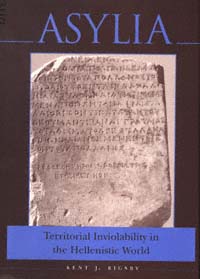 | Title: Asylia: territorial inviolability in the Hellenistic world Author: Rigsby, Kent J 1945- Published: University of California Press, 1997 Subjects: Classics | Ancient History | Politics | Classical History | Classical Religions | Classical Politics Publisher's Description: In the Hellenistic period certain Greek temples and cities came to be declared "sacred and inviolable." Asylia was the practice of declaring religious places precincts of asylum, meaning they were immune to violence and civil authority. The evidence for this phenomenon - mainly inscriptions and coins - is scattered in the published record. The material has never been collected and presented in one publication until now.Kent J. Rigsby lays out these documents and discusses their historical implications in a substantial introduction. He argues that while a hopeful intention of military neutrality lay behind the institution of asylum, the declarations did not in fact change military behavior. Instead, "declared inviolability" became a civic and religious honor for which cities across the Greek world competed during the third to first centuries B.C. [brief] Similar Items |